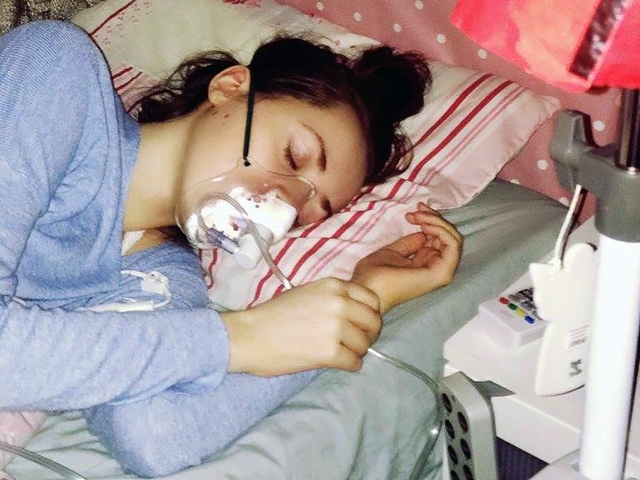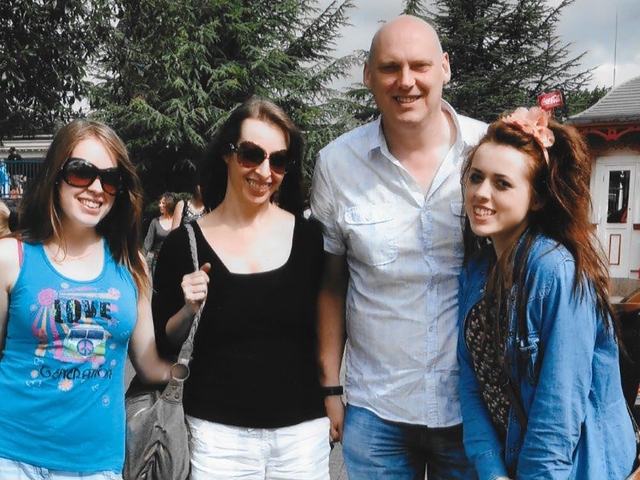Heartbroken family tell of how daughter slowly died after battling ME
Date published: 06 April 2018

Merryn Crofts died aged just 21 after battling ME
Scroll down for Video
A heartbroken family have told of how they watched their daughter die after battling a debilitating disease.
Merryn Crofts from Norden was just 21-years-old when she died after a six-year battle against Myalgic Encephalomyelitis (ME), a neurological illness that causes immense and insufferable pain that affects approximately 250,000 people in the UK.
Now Merryn’s family – mum Clare Norton, sister Amy Williams and step-dad Dave Norton – are speaking out to raise awareness of the debilitating disease and change the future for other sufferers.
Amy said: “Merryn was a normal teen. She had big hair and a big personality. She was very outgoing and active, she loved drama and she was always smiling. She was a very social person and loved school, it was rare that she was home.”
When Merryn was 15, her face, hands and feet suddenly became severely swollen with what was originally thought to be an infection.
Her mum, Clare, recalled: “She had these strange feelings, she was so white, she had heavy legs and problems breathing.”
In addition to excruciating hypersensitivity to touch, light and sound, the Oulder Hill pupil also suffered from severe migraines, brain fog, slurred speech, agonising stomach problems, and problems swallowing.
Her weight plummeted to just five-and-a-half stone (35kg) and she was also given a feeding tube before being fitted with an intravenous nutrition line. She later developed an infection in spring 2017 which meant she had to stop using the tube.
Clare commented: “Each time Merryn came out of hospital, she was worse. The last time she said she was never going back in.”
By the end of her first year of falling ill, Merryn was no longer able to walk. After a recommendation, the family went to see a specialist at a private clinic, who diagnosed Merryn with ME. An NHS ME consultant in Wigan also agreed Merryn was suffering from the condition.
The ME Association lists the seven key symptoms of the disorder as post-exertional malaise or symptom exacerbation, activity-induced muscle fatigue, cognitive dysfunction, pain, sleep disturbance, ongoing ‘flu-like’ malaise, and autonomic symptoms. Of those affected in the UK, 25% are severely affected by the illness and 2% very severely affected. It affects four times as many women as men and a cause has not yet been identified.

Merryn Crofts
Clare continued: “Merryn became so bad she needed a wheelchair. She became housebound and then bed-bound over the six years. Oulder Hill were amazing with her. She was using a wheelchair at school during the first year because she couldn’t stand up. She was so sensitive to the light that the curtains were always closed.”
Merryn, who was bed-bound for the last three-years of her life, was on ‘massive’ amounts of medication such as morphine and ketamine, which helped “reduce her pain to a level that we’d still consider unbearable,” Clare explained.
“She needed the pain relief, but taking it hurt. It never got rid of her pain, but it was a case of which pain is worse. Springhill Hospice told us that it was rare for a person to be on the pain relief she was taking and still be in pain. They were amazing with Merryn. We also had so much emotional support from the professionals who did diagnose Merryn with ME. Merryn felt like they listened to her.
“We couldn’t all go in her room as a family, and we could only spend a short time seeing her. It was normal for me to be there, but we couldn’t give her any hugs. I had a way of lying around her without touching her just so she didn’t feel so alone.
“ME is a very isolating illness. I was scared to death. I stopped reading because the recovery prognosis was so terrible.
“We were able to control Merryn’s environment when she wasn’t in hospital, but it was hard in the summer with birds, people mowing their lawns. She did have ear defenders, but they hurt her because they were so heavy.”

Merryn with her family
Amy commented: “Merryn loved clothes, her hair, makeup and anything girly. She had a way of attracting funny situations, like people photographing her because they loved her look. She was her own person. I think she’d had every hairstyle, but it got to the point when she couldn’t do her hair. We were devastated when she said cut my hair off.”
Clare said: “I couldn’t brush her hair without there being pain because it was so matted. She couldn’t wear the clothes she wanted, so she still bought the ones she liked and we would hold them up so she could see them.”
She continued: “We ran into so many problems because of professionals refusing to accept her ME diagnosis. The first three years were appalling. No one would accept the diagnosis, even though we had letters saying she had it; we were told she can’t be that ill, she’ll get over it because she’s young, and one person told us ‘at least it’s not cancer’. People in the ME community cling to hope, but there is nothing there.
“She had hopes and dreams for the future. She was upset about possibly never having children as she always wanted to be a mum and have a family. She was a stubborn bundle of fun, but the stubbornness kept her going. She could laugh at herself and see the humour, and she never complained or wallowed in her illness.”
Merryn, who loved acting, had dreams of attending a performing arts school in Liverpool and adored musical theatre like Billy Elliott and Wicked. She had wanted to study at college, and attended, lasting only two weeks due to her chronic illness.

Merryn adored musical theatre like Billy Elliott
Merryn even underwent mental health assessments, which showed her illness was physical. Despite this, her family still faced problems with medical professionals offering diagnoses of panic attacks and conversion disorder, formerly known as hysteria.
Her mum continued: “Some doctors believe she was too ill to have ME because they don’t realise how bad it gets. At its most severe, it is similar to the last stages of AIDS or cancer. There is so much awareness and training needed.
“Someone even put in a safeguarding report and social services were appalled when they came out; luckily, we had a good social worker. It’s common for children with ME to be forcibly removed from their parents and kept away, when this happens, the condition still gets worse.
“Young people with ME have the most likely chance of improving, but they’re also likely to have the severest form. This is why it’s very important for an early diagnosis and of the correct illness.”
Amy noted: “The best advice we were given was whatever Merryn thinks she can do, do 50% of it and then she has some reserves.”
Dave added: “It got to the point when Merryn had no reserves and she was borrowing from days ahead.”
Clare explained: “We brought Christmas forward in 2017. On her last Christmas in 2016, we brought the bed into the front room. We knew Merryn was terminal but she was determined to be with us on the day, even though she was in agony. To her, it was worth it for a short time.
“We kept thinking she’d get over this and improve: looking back, this never happened. She improved once in the first six months during the summer holidays.
“The most severe sufferers are often the most hidden. A lot of people give up and their families are left fighting, so they can’t raise awareness. There’s a high risk of suicide with ME sufferers.
“Because people see those who are mild and moderate, we think this is why there is such a misunderstanding, they can work part-time, but even afterwards, people won’t see the crash and paying back for the next day.
“ME used to be called atypical polio, and awareness seems to be where MS was 40 years ago. Funding for ME is so small, but it’s not the only condition. There’s also Ehlers-Danlos Syndrome, Lyme disease and even endometriosis where sufferers are told it’s in their heads.”

Merryn was bed-bound for the last three-years of her life
Whilst Merryn was ill, Manchester-based charity Dreams Come True organised a day where staff from Ted Baker and the Disney store at the Trafford Centre came and did a pop-up shop at home. The generous staff clubbed together their discounts for her, enabling Merryn to pick out items for those she loved.
Merryn still loved to order clothes online, and left the original labels attached. After she died, her family held ‘Merryn’s Pop-up Boutique’ where they sold many of the 21-year-old’s purchases, raising money for the Grenfell Tower appeal because “it’s what Merryn would have done.”
Before she died, Merryn also organised her funeral, and wanted her brain and spinal column to be donated to ME research. They were donated to the Ramsay Research Fund, a charity conducting research into the causes of ME.
She also wrote personal letters for her family, which took over a year to type.
Despite a long battle, Merryn died just ten days after her 21st birthday.
Clare said: “Merryn’s last words to me were, ‘I’ve got to get off now’. I told her she was okay, safe and in bed. She said she loved me and said ‘I’ve got to get off now’ again. I went out to ring the district nurses and when I came back in, she was gone.”
Amy added: “I came up the day before, and even though she couldn’t speak too loudly, this booming voice said, ‘I love you’.
“Did she have an inkling? We were surprised at how long she lasted, and we had thought she was holding out for her birthday. We found out that her best friend’s last university exam was on the 22nd, and it felt like Merryn had held on so she didn’t have to go into her last exam with that weighing on her.
“It was like everything that had happened, had happened to make it easier on her family.
“People find it hard to understand, with the medical advancements, how something like this can happen in this day and age.”
“This country is so behind America and their research.
“ME is truly devastating for the 25% who have severe ME, lying in a dark room being tube fed, paralysed with no medical services. They are some of the sickest people receiving the worst service. People need to take ME seriously, even though they might not have heard of it.”
Her family have also set up a page in her memory, aptly named ‘Merryn’s Legacy’, and will be taking part in ‘Millions Missing’ on 12 May, a movement during ME awareness week (7 – 13 May) demanding change for sufferers. The day aims to bring sufferers together by laying out a pair of empty shoes, representing the life missed due to the illness.
Amy added: “We will be taking Merryn’s shoes to show her presence.”
An inquest into Merryn’s death will also take place in May.
You can find out more about ME at:
Amy Williams reading Merryn Crofts' words about Myalgic Encephalomyelitis (ME)
©Rochdale Online
Do you have a story for us?
Let us know by emailing news@rochdaleonline.co.uk
All contact will be treated in confidence.
Most Viewed News Stories
- 1Northern Healthcare opens supported living service in former Rochdale hotel
- 2Former councillor and hospital campaigner Jean Ashworth has died
- 3Rochdale man charged after teenager attacked with substance in Stockport
- 4Local outfit CPS Mobility Scooters offers outstanding service and performance
- 5Week of action targeting sexual predators leads to eight arrests and 21 children safeguarded
To contact the Rochdale Online news desk, email news@rochdaleonline.co.uk or visit our news submission page.
To get the latest news on your desktop or mobile, follow Rochdale Online on Twitter and Facebook.


